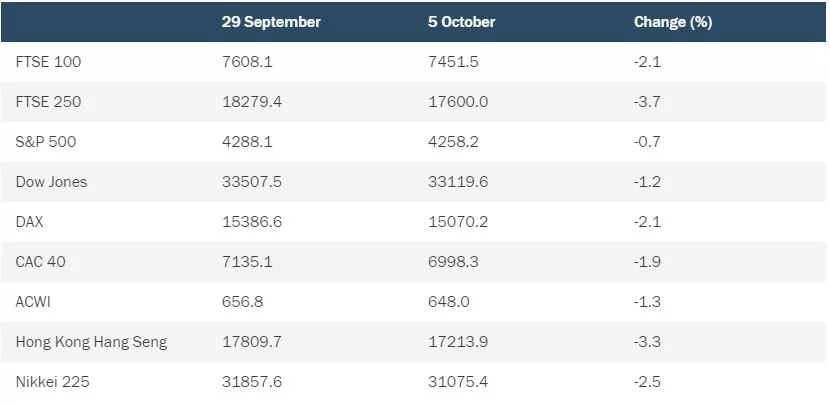A new month has done little to brighten investors’ mood, with fears of a prolonged period of high interest rates continuing to weigh on sentiment in global markets
Sharp rises in yields on government bonds on Tuesday and Wednesday reflect the fact that investors increasingly expect tight monetary policy in the United States and Europe to continue well into 2024. With further signs of resilience in the American economy, the dollar reached new highs against a range of currencies mid-week – a development that will only increase inflationary pressures outside the US. The World Trade Organisation cut its forecasts for global growth on Thursday, citing a likely slowdown in international manufacturing. Slowdown fears also prompted a fall in the price of oil following its recent surge.
United States
On Wall Street, the Dow Jones Industrial Average ended trading on Thursday 1.2% down for the week so far, with the S&P 500 losing 0.7%. The week began on a positive note after lawmakers in Congress reached an eleventh-hour deal to avert a government shutdown. However, the relief was short-lived after Republican rebels forced the exit of House speaker Kevin McCarthy on Tuesday – a move that is expected to increase the likelihood of another shutdown showdown before the end of the year. Economic data indicated a small increase in manufacturing output in September as well as a larger-than-forecast rise in job vacancies in August, putting further pressure on the Federal Reserve to raise interest rates yet again.
UK
In the UK, the FTSE 100 closed on Thursday 2.1% down for the week so far, with receding oil and commodity prices driving down the price of major energy and mining stocks. Economic data in Britain was again mixed: there was positive news in the shape of a month-on-month fall in grocery prices, while updated figures showed that September’s service sector contraction was less severe than originally estimated. House prices continued to fall, however, while last month UK construction firms recorded their steepest fall in output since the early weeks of the Covid-19 pandemic in 2020. The mood in the sector was not helped by the government’s controversial decision to scrap the northern section of the High Speed 2 rail project.
Europe
In Frankfurt, the DAX index ended Thursday’s session down 2.1% for the week, while France’s CAC 40 lost 1.9%. News that eurozone unemployment had reached a record low could raise the chances of the European Central Bank increasing interest rates further, and the cost of government debt in Germany rose to its highest level since 2011. However, the ECB will need to take into account signs of slowing European growth at its next monetary policy meeting: private sector demand in the eurozone was reported to have fallen at its fastest rate in three years in September, while German export volumes also declined.
Asia
In Asia, the Hang Seng index in Hong Kong shed 3.3% as Chinese economic data continued to underwhelm. Weak factory output figures for September were the latest sign of a spluttering post-pandemic recovery. Japan’s Nikkei 225 index of leading shares fell 2.5% on fears of higher interest rates in the US. Meanwhile, efforts by the Bank of Japan to support the yen in the face of the soaring dollar on Tuesday appeared to be largely ineffective.

Note: all market data contained within the article is sourced from Bloomberg unless stated otherwise, data as at 5 October 2023.

